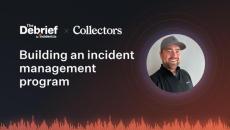|
By incident.io
There’s no two ways about it: on-call is stressful. But with humans at the center, it’s especially important to find ways to make it as manageable and empathetic as possible. In this webinar with our friends at ELC, incident.io VP of Engineering, Noberto Lopes, and Intercom Staff Product Engineer, Andrej Blagojević, discuss their own experiences with on-call, and how the process can be better.
|
By incident.io
The launch of On-call was an integral part of the incident.io mission to become the single place you turn when things go wrong, and recently we hosted a live virtual event to show how it all came together. In this event, incident.io Co-founder and CTO Pete Hamilton sat down with incident.io Product Manager Megan McDonald, Product Engineer Rory Bain, and fellow Co-founder and CPO Chris Evans to demo the product, discuss the journey of the creation, and expand on what’s next.
|
By Luis Gonzalez
At incident.io, “We care about our customers” isn’t just a talking point. It’s a core part of how we operate. Whether it’s a big feature request or a small bug fix, we’ve been intentional about making sure that customers always feel heard and seen—no matter the ask. But it’s not just that.
|
By Norberto Lopes
In the fast-paced world of software development and product delivery, incidents are often viewed as unwanted disruptions. Traditionally, incident management might only trigger for critical issues, like complete system outages, data loss of some kind, or security-related ones - you don’t need to go back that far for a few that were very serious: Heartbleed, xz utils, and more.
|
By incident.io
We’re ecstatic to announce that we’ve been ranked #1 in G2’s Relationship Index for Spring 2024. G2's Relationship Index is a measure of several factors, including: This award means a lot to us as it’s a direct result of the partnerships we’ve built with customers—and it’s a recognition we’re very proud of. From the beginning, we’ve been laser-focused on being the single place you turn to when things go wrong.
|
By Chris Evans
Here at incident.io, we're always pushing the boundaries of incident management and seeking new ways to enhance your on-call experience. That's why we're excited to announce our latest feature that's set to level-up the way you respond to incidents.
|
By Chris Evans
I spotted this thread on Reddit, discussing the pains of executives dropping into incidents, and the corresponding impact it can have on the incident response process. Being an SRE community, it was a little more of a one-sided account of the situation. So let’s look a little closer, and dive into what it takes to make incidents better for responders and executives alike.
|
By Tom Petty
On your bedside table sits a piece of software designed to wake you up. It loves bothering you when something goes wrong — and making it your responsibility to sort it out Meet the new incident.io On-call app. We designed it this way: to be as interruptive as possible. Whether you’re watching telly, at the gym, or as mentioned, fast asleep, it’ll get you. Got called even though you’re in silent mode? Great! We’ve done our job properly.
|
By incident.io
Everyone experiences stress at work—thankfully, it’s a topic folks aren’t shying away from anymore. But for on-call engineers, alert fatigue is a phenomenon closer to home. Unfortunately, like stress, it can be just as insidious and drastically impact those it affects. First discussed in the context of hospital settings, this phrase later entered engineering circles.
|
By incident.io
Today, incident management is a core part of organizations both big and small. But what if you don't have a program in place...where do you start? Or what if incident management is already a key part of your org, but you're looking to optimize it—where do you kick things off in that case? Consider another situation: What if you're an established organization with years of incident management experience—what are some things that you can do to take things to the next level?
|
By Incident.io
In this clip, Dennis Henry of Okta explains why having more low-severity incidents can be a good thing. In last week’s episode of The Debrief, we had on Colette Alexander, Director of Engineering at HashiCorp, to discuss some of the myths around incident response. In that conversation, one of the myths we spoke about was the idea that asking “why” is better than asking “how.” And how, in reality, asking "how" allows you to focus more on the contributing factors that led to an incident happening, whereas “why” tends to single out a person, which can lead to a lot of blame.
|
By Incident.io
In this clip, Dennis Henry of Okta explains why it's important to remember that mistakes happen for several reasons and don't have a single cause. In last week’s episode of The Debrief, we had on Colette Alexander, Director of Engineering at HashiCorp, to discuss some of the myths around incident response.
|
By Incident.io
In last week’s episode of The Debrief, we had on Colette Alexander, Director of Engineering at HashiCorp, to discuss some of the myths around incident response. In that conversation, one of the myths we spoke about was the idea that asking “why” is better than asking “how.” And how, in reality, asking "how" allows you to focus more on the contributing factors that led to an incident happening, whereas “why” tends to single out a person, which can lead to a lot of blame.
|
By Incident.io
incident.io is the single place to turn when things go wrong. We started with Response to help with coordination and communication. Next, we launched Status Pages to keep internal and external stakeholders up-to-date. And most recently, we added On-call to get the right people in the room when things go wrong.
|
By Incident.io
In this clip, Colette explains why focusing on coming up with a list of action items post-incident is a big mistake. About the episode: What if we told you that everything you thought you knew about incident response was wrong. Well, at least some of it. That some of the things you’ve been doing for years might not actually be having the impact you thought they did. Or, even worse, that some of the assumptions you’ve been making have actually been having a negative impact on you, your team and your organization.
|
By Incident.io
In this clip, Colette explains what the underlying issue is with DORA metrics. About the episode: What if we told you that everything you thought you knew about incident response was wrong. Well, at least some of it. That some of the things you’ve been doing for years might not actually be having the impact you thought they did. Or, even worse, that some of the assumptions you’ve been making have actually been having a negative impact on you, your team and your organization.
|
By Incident.io
Whether you’re a seasoned company with 10+ years of operations, or a startup that’s just getting off the ground, making sure you have a good culture of engineering is really important. Not only will this have a significant impact on the folks on your team, it’ll make a big difference with hiring. When everyone knows that your company is the place to be when it comes to culture, attracting really good talent becomes that much easier.
- May 2024 (4)
- April 2024 (18)
- March 2024 (14)
- February 2024 (18)
- January 2024 (9)
- December 2023 (10)
- November 2023 (5)
- October 2023 (10)
- September 2023 (16)
- August 2023 (3)
- July 2023 (8)
- June 2023 (6)
- May 2023 (4)
- April 2023 (8)
- March 2023 (2)
- February 2023 (5)
- January 2023 (6)
- December 2022 (3)
- November 2022 (4)
- October 2022 (10)
- September 2022 (7)
- August 2022 (11)
- July 2022 (6)
- June 2022 (3)
- May 2022 (2)
- April 2022 (3)
- March 2022 (6)
- February 2022 (7)
- January 2022 (2)
- December 2021 (5)
- November 2021 (5)
- October 2021 (2)
Create, manage and resolve incidents directly in Slack. Leave the admin and reporting to us.
Improving your incident response, visibility, and ability to learn:
- Less faffing, more fixing: We take care of the admin during incidents, so you can save your brainpower for the decisions that matter.
- Divide and conquer: We make sure everyone’s role is clear, track who’s working on what, and help you escalate if you need extra help.
- Get up to speed, at speed: Get everyone on the same page from the moment they join the incident, and help stakeholders stay in the loop.
- Timelines, in no time: Constructing an incident timeline for review is important, but time consuming. We’ll build one for you in real-time, and keep it constantly up to date.
- Data and insights you can trust: You’ve already paid for your incidents. By surfacing the data you need to make decisions, we help you get your money’s worth.
Incident response for your whole organisation.





















